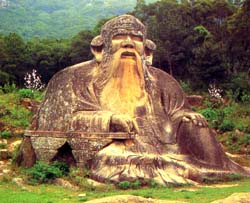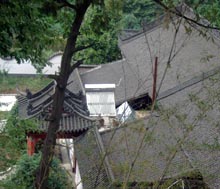The sage Lao Zi to be Daoist God of Ecological Protection
June 18 2007:
 |
 |
 |
The newly adopted God of Ecological Protection |
The great Daoist sage Lao Zi is to become China's God of Ecological Protection.
Eighteen of China's most prominent Daoist abbots, including three senior nuns agreed earlier this month that from now on their most important figure, Lao Zi, would be formally adopted as the God of Ecological Protection. They would also undertake environmental audits of all their landuse and resources. Link
here for the full report from that meeting.
Lao Zi (sometimes also referred to as Lao Tzu) is said to have been the author of the Daoist book the Daodejing (Tao Te Ching), a book of just 5,000 characters, written some 2,500 years ago and full of wisdom about how people can live simply in a complicated word. The messaage of the Dao De Jing will be used positively to promote ecological awareness - including producing amulets with pictures of the sage inscribed on them, for pilgrims to buy and wear on their wrists, to remind them always to protect nature - in the name of their beliefs, and of Lao Zi.
The monastery where the Daodejing is said to have been written is Louguantai Temple, and so it is perhaps appropriate that its abbot, Master Ren, should have been one of the inspirations behind suggesting and promoting this new role for Lao Zi.
Master Ren is also the abbot for China's first Daoist Ecology Centre - built by Louguantai with the help of ARC, and sponsors including the Dutch Ecological Management Foundation (EMF), private sponsors Steven and Marjolaine Schuit and WWF-International - at the foot of the Tai Bai holy mountain, where the meeting was held.
"The launch of the Taibaishan ecology temple is a sign to the world that Daoism wishes to follow the Dao in conserving and respecting nature," Master Ren said. "We must now translate the ideas and beliefs we have received through our scriptures and traditions into real actions which can guide the world towards a proper relationship with the Dao. This is a light that we have lit and which must now shine across China and even into the world."
Other highlights of the meeting included testimonies by several Daoist Masters of how their temples had already started installing solar panels on their subsidiary temple and administrative buildings (leaving, of course, the great historical structures untouched), have set up a new cooperative to mass purchase eco-friendly incense. The meeting culminated in an agreement by all eighteen monasteries and nunneries that they should each carry out an audit of their current eco-footprint.
 |
 |
 |
Solar panel on admin building at Louguantai. Direct result of 2006 Qinling Declaration. Photo by James Edgerley |
"Their beliefs might come originally from China's ancient past, but this shows that the Daoists are very serious indeed about looking after China's future," said Martin Palmer, Secretary General of ARC.
Founder of EMF, Allerd Stikker added: "Today a spark of renewal lit the opening ceremony of the Taibaishan Tiuejia Ecology Daoists Temple. Following from the Qinling Declaration last year, the Daoists have promised to become involved in protecting China's natural environment in very practical ways. It is a remarkable initative that will spread all over the country and beyond. Today is also a great day of encouragement to the efforts of the Alliance of Religions and Conservation."
The workshop has also recommended that every monastery and temple in China be contacted, recommending that they too undertake the environmental audit.
This was the second workshop at the Taibaishan Tiejia Daoist Ecology Temple in which monks and nuns discussed how they can better protect the environment in, around and through their temples.
Many reported on making excellent progress since the first workshop in July 2006 when an agreement now known as the Qinling Declaration was signed, giving six promises about helping the environment - and the word has already spread throughout the Daoist community so that this second workshop was greatly over-subscribed.
“A journey of a thousand miles begins at the place where you stand.”
 |
The Great Way is easy,
but people are forever being taken down sidetracks
They look after the palaces,
but ignore the fields!
The granaries are empty
but they wear wonderful clothes!
Daodejing Chapter 53. Link here for other Daoist quotations about the environment. |
|
 |
 |
Highlights of the Group DiscussionsIn addition to the agreements about this most important audit, and about adopting Lao Zi as God of Ecological protection, highlights included:
*** Master Ren, abbot of Louguantai, describing how he and his fellow monks had installed solar panels onto the roofs of the ancillary buildings of their temple. Although of course the ancient temples had been left, the monks had found a way of putting solar panels onto the other buildings, so that they did not destroy the sense of historical beauty of the whole complex. He also mentioned how his temple harmonised with nearby communities to deal with land use management such as sewage treatment etc.
*** A testimony that the nuns in the Ziyanggong Daoist temple of Tiantai (“the terrace of Heaven”) County in Zhejiang Province had already applied solar systems to their building and eco-friendly incense to their worship. In fact in many cases the nuns tended to be even more positive than the monks.
*** An announcement from Jinxianguan temple near Xian that in the 11 months since they attended the previous workshop they had applied solar systems to their buildings and also that they had started to recycle water for use in their garden for trees and plants.
*** Master Zou of Huashan - the abbot of Jade Spring Temple, and Vice president of Shaanxi Daoist Association - saying he now pays more attention to protecting the environment of, and around his temple. He had, for example, reduced the number of incense burner to reduce pollution caused by incense burning.
** Master Xu – the abbot of Woyunshan Daoist temple at Mt Woyun in Shaanxi Province - saying after the presentation by Dr He that he would set up a lightning rod to protect his wooden temple buildings from storm damage and lightning fire.
*** A testimony from some of the temples, which have already made steps to carry out the Qinling Declaration that they signed in 2006. For example, all temples in Wuyunshan of Jingbian county of Yulin city of Shaanxi province have set up posters around their monasteries with the Qinling declaration.
*** Praise of ARC’s work and both the workshops by special guest Ms Ye Guangqin, a well-known author and screenwriter in China. She is known for her concerned about the environmental protection of the Qinling area. “What you have done is really meaningful for Qinling,” she said.
Link here for the full report from the June 2007 workshop.
Link here for the Daoist temple audits in both Chinese and English.
Link here for details of ARC's speech at the Daodejing Conference in Xian in April 2007, describing how Daoists have very special things to teach about preserving nature.
Link here for Chinese version of the Daodejing speech.
Link here for the Daodejing Forum website.
Link here for a story about the Daodejing Forum from the South China Morning Post - with a spectacular photograph.
Further linksLink to more photographs from the June 2007 workshop and Ecology Temple Opening here..
Link to a news story of how the June 2007 workshop was oversubscribed.
Link here for ARC's presentation at the April 2007 Daodejing conference, showing how ancient Daoist teachings are a practical guidebook today to looking after the earth.
Link to details of the July 2006 Workshop on Daoism and Conservation.
Link to the Qinling Declaration, July 26 2006
Link to the Daoist Statement on the Environment, made in 1995.
Link to further information about Daoist beliefs.
Link to presentation in Chinese in August 2006 about Daoism and the Environment by Professor Fan Guiching: 西北道教生态保护实例展示
Link to presentation in Chinese in August 2006 about ARC's projects by Dr He Xiaoxing: 环境保护的意念和项目
Link to presentation in Chinese in August 2006 by Dr He Xiaoxing about the potential for Daoists to help the environment: 古老智慧和新角色:道教和环境保护
|

